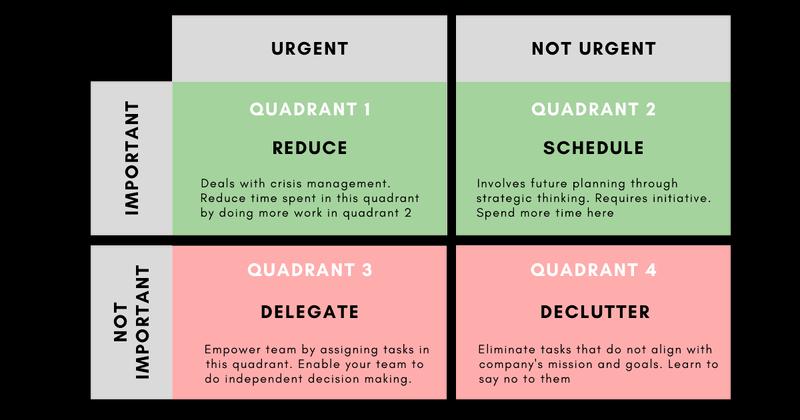ORGANISATIONAL SKILLS: PERSONAL SUCCESS TRAINING PROGRAM - DAY TWO
ORGANISATIONAL SKILLS: PERSONAL SUCCESS TRAINING PROGRAM - DAY TWO

UNIT TWO – PRIORTISE
Organisation doesn’t only refer to our physical items and possession; it can also include organising our time and activities.
Taking time to label what we want and what we need to accomplish allows us to sort out everything and find a way to tackle it! Since everything is lined out and identified, regulating our time and energy can seem less overwhelming.
WRITE IT DOWN
When organising your priorities, it is important to write them all down.
Make yourself some sort of ‘master list’ because it helps you remember everything you want to accomplish.
This list gives you visual aid to use when making organisational decisions. Common codes such as ABC or 123 can be used to determine each listing’s priority, and how you will proceed with each one.
URGENT / IMPORTANT MATRIX
Sometimes we confuse our urgent priorities with our important ones; which can cause us to be confused about what to take care of first.
The Urgent / Important, is a tool that we can use to think about our priorities and how to handle them. Before we can use the matrix, we must write down everything we want to accomplish in a certain period of time, i.e. daily, weekly; or even further, and assign their priority in which we want to get them done (see exercise from day one).
The matrix is divided into four quadrants, each ranging in importance. This allows for activities and projects to be plotted in each one based on their need. Using the list you create, you would plot each job in the corresponding quadrant.
After all the tasks have been plotted, we can see all the things we want or need to do, and how important or urgent they are to us. This leads us to make better choices regarding our time management and overall organisation.
There are many versions of the Urgent / Important Matrix that can be used for various things.
DIVIDE TASKS
Now that you have made a list and categorised all the things you want to accomplish, it can seem overwhelming or even intimidating to get started.
By dividing your tasks into small groups of things to do, we can feel more empowered to get them done! Task can be divided any way that is convenient.
The key is to find what combination works for you.
HELPFUL HINTS
• Sort tasks by each specific project.
• Decide which task can be done the fastest.
• Determine which task need more time.
80⁄20 RULE
Simply put, the 80⁄20 Rule emphasises the need to focus on what is important to us; and disregard the rest!
In most cases, 20% of things we have accumulated are important to us, while the other 80% is usually trivial, if not useless.
If the 20% is handled first and focused upon, the remaining 80% practically takes care of itself.
By using the 80⁄20 Rule, you can sit down with your daily ‘to do list’ and identify the top three or four projects or tasks that need to be done right now (20%).
Then outline the less important / mundane things that can be done next or even at a later time (80%).
By focusing on what is most important / urgent first, we are more focused and ready to tackle them. Once they are completed, the rest of the tasks seem less daunting and can be done with ease.
The 80⁄20 Rule is about being organised while doing what you want in your everyday life – not just more organising.
Be the first to post a message!